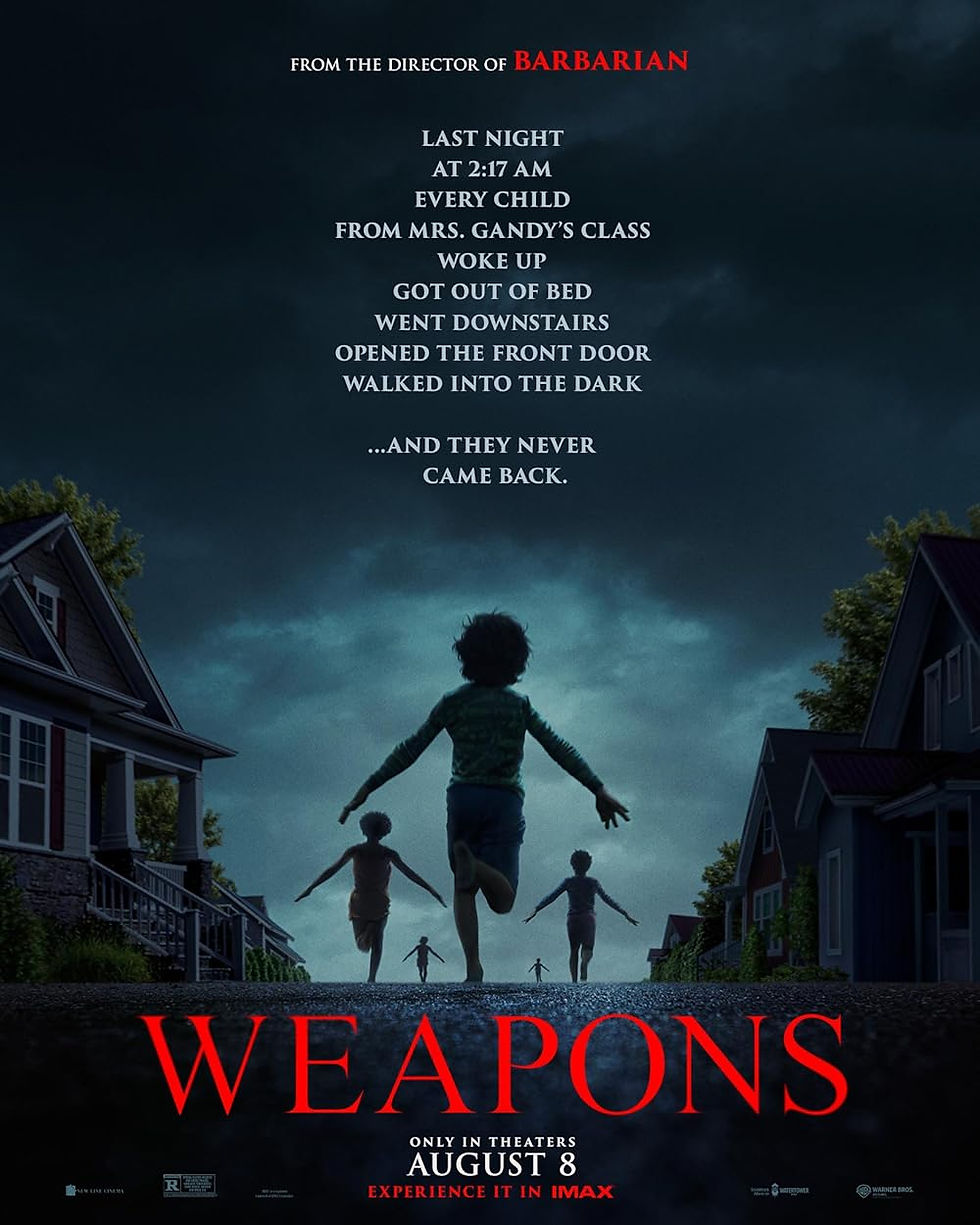Weapons
- Young Critic

- Aug 18, 2025
- 4 min read
Updated: Sep 15, 2025
A Chilling Mystery and Shaky Reveal Signal a Director on the Rise

Zach Cregger has burst onto the horror scene in a way that few filmmakers do – once a decade at most. He’s echoing the career impact that M. Night Shyamalan and Jordan Peele had in the 1990s and 2010s, respectively. His chillingly creepy debut Barbarian (2022) was one of the few films of the last several years to keep me up at night, and his new effort Weapons (2025) demonstrates that his creativity and flair were not a fluke.
Weapons is an original (!) story about how a suburban American community deals with the disappearance of 17 third graders on the same night. They all happened to be in the same class, taught by Justine (Julia Garner). At exactly 2:17 a.m., the missing kids woke up, opened their front doors, and ran into the night. Only one child from the class remains: the young and reserved Alex (Cary Christopher). The film flits between perspectives, starting with Justine and then shifting to other affected community members, such as a parent of one of the missing kids (Josh Brolin), a local cop (Alden Ehrenreich), and the town junkie (Austin Abrams).
Cregger knows that to craft a compelling scary film, you need a mystery. There is nothing more terrifying to human beings than not knowing; it’s why entire branches of society, from religion to science, are desperate—almost panicky—when they can’t deliver an answer to all our questions. Cregger plays with that fear of the unknown, unspooling his mystery slowly and relishing the moments when he raises more questions rather than answers. This worked similarly in Barbarian, where viewers were drawn in by the increasingly complex and seemingly unexplainable events.
Yet as bizarre as Barbarian’s finale was, its answers felt more satisfying than what ends up being the ultimate culprit in Weapons. That’s not to say Weapons is a let-down, but the reveal falls short of the crescendo of anticipation Cregger keeps building—he essentially sets himself impossible standards. This is a trap many horror prodigy directors have fallen into: Peele’s Nope (2022), while still a great film, couldn’t quite deliver on its initial mystery; Shyamalan, meanwhile, almost became a punchline for his clunky reveals after failing to match the cultural gut punch of The Sixth Sense (1999). Mysteries often suffer this fate, because the journey of not knowing is inherently more intriguing than most answers a storyteller can provide. Few manage to land it—Arthur Conan Doyle and Agatha Christie being rare exceptions. Even Spielberg’s Jaws (1975) is infinitely scarier in the scenes without the shark than in those where the creature is fully revealed. Such is the case with Weapons, albeit the stumble lies less in the reveal itself than in a cop-out explanation for an impossible mystery.
Cregger also continues to use horror as a way to explore subtle social commentary. While Weapons, much like Barbarian, isn’t the sort of “social horror” we’ve come to associate—somewhat problematically—with Black directors such as Peele and Nia DaCosta, both of Cregger’s films carry fascinating themes. Barbarian tackled gentrification and the abandonment of neighborhoods; Weapons is a more direct commentary on the trauma of school shootings. The supernatural elements dominate the third act, but the first two acts could be read almost straightforwardly as a community digesting and reacting to a school shooting. This deepens when we learn what led to the children’s disappearances (no spoilers here, but it touches on family strife and isolation). These moments are where the film shines most, giving its actors space to explore grief, the desperate need to assign blame, the frustration of unanswered questions, and the scarring left on survivors.
As Cregger’s profile rises, so does his ability to attract Hollywood star power. Garner is spectacular as the guilt-ridden teacher—though she has no real fault of her own. Brolin is solid as a paranoid, frustrated father. And Ehrenreich once again proves himself a scene-stealer, finally free of the weight of his early career hype. After breaking out in the Coen Brothers’ Hail, Caesar! (2016), he was rushed into A-list stardom with Solo: A Star Wars Story (2018), which flopped and derailed his momentum. In recent years, though, he’s re-emerged as a sharp supporting actor in Cocaine Bear (2023), Oppenheimer (2023), and Marvel’s Ironheart (2025). In Weapons, he delivers another magnetic performance, this time as a jittery, insecure cop.
But the film is stolen by Amy Madigan’s late-act appearance as the enigmatic Gladys. Once a reliable star in the 1980s, she—like many older actresses—was sidelined by Hollywood. Weapons revives her career in a big way. Even when the script edges into cliché, her screen presence is undeniable. It’s a commanding, career-renaissance performance that deserves to be followed by a wave of new roles.
Cregger, meanwhile, keeps sharpening his technical craft. He retains the unsettling camera tilts and off-kilter movements of Barbarian, forcing us to see the world through displaced and claustrophobic angles. His knack for eerie images and earned jump scares remains intact, as does his rare patience in letting characters develop—something so often missing in horror.
In the end, Weapons is a strong follow-up to Cregger’s debut. Hollywood studios are already elbowing each other for a piece of his schedule (a prequel to Weapons has been greenlit, and he’s also been tapped to reboot the Resident Evil franchise). The strong character work and social undercurrents of this film’s first two acts, combined with an incremental, engrossing mystery, keep viewers hooked. Even if the finale doesn’t quite match the build-up or the breathless intensity of Barbarian, the film firmly establishes Cregger as horror’s newly crowned prince.
7.5/10








Comments